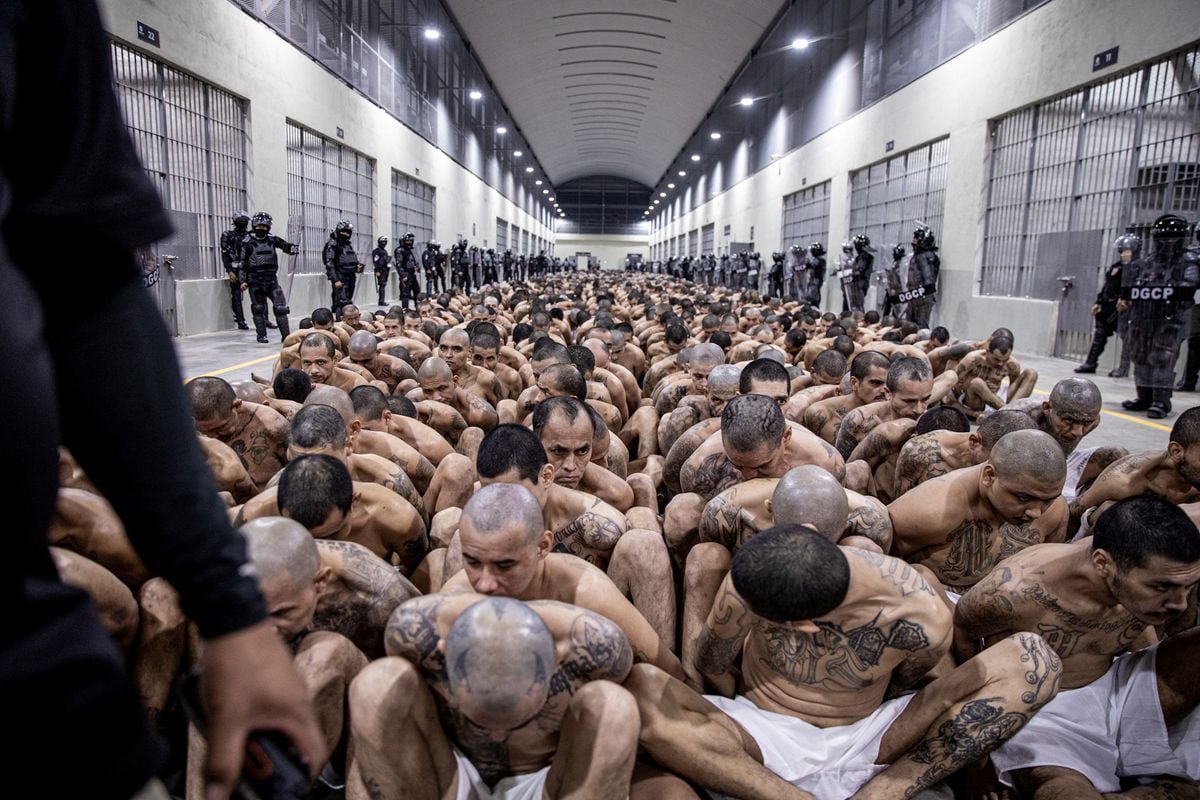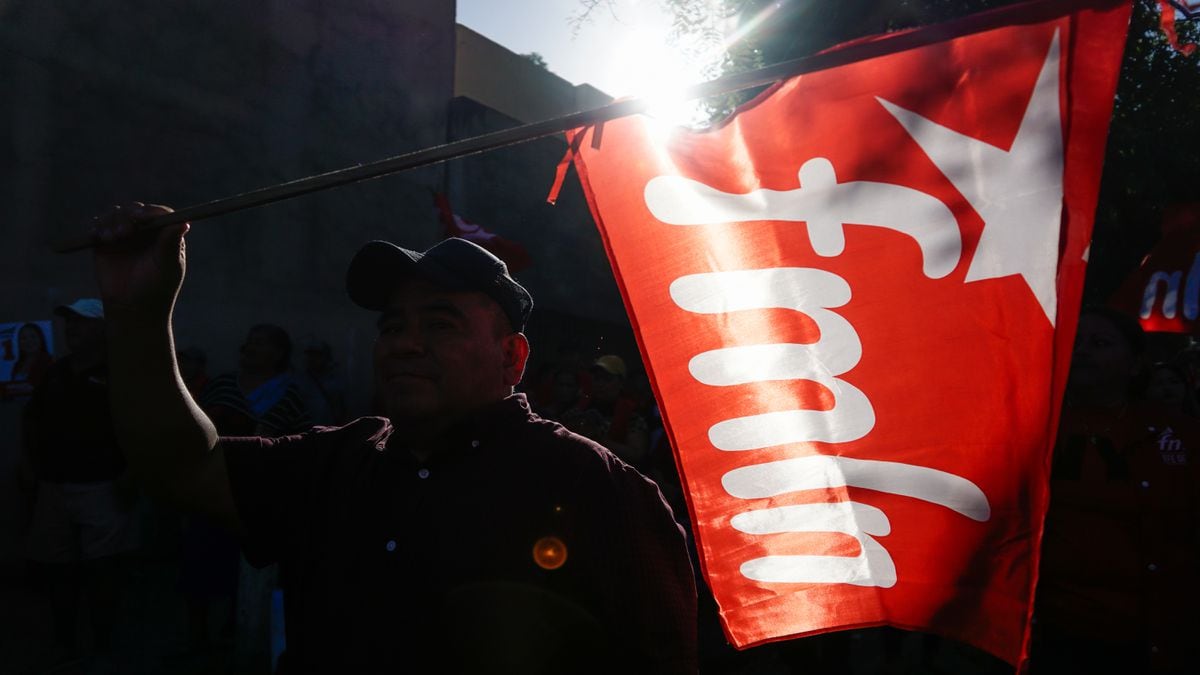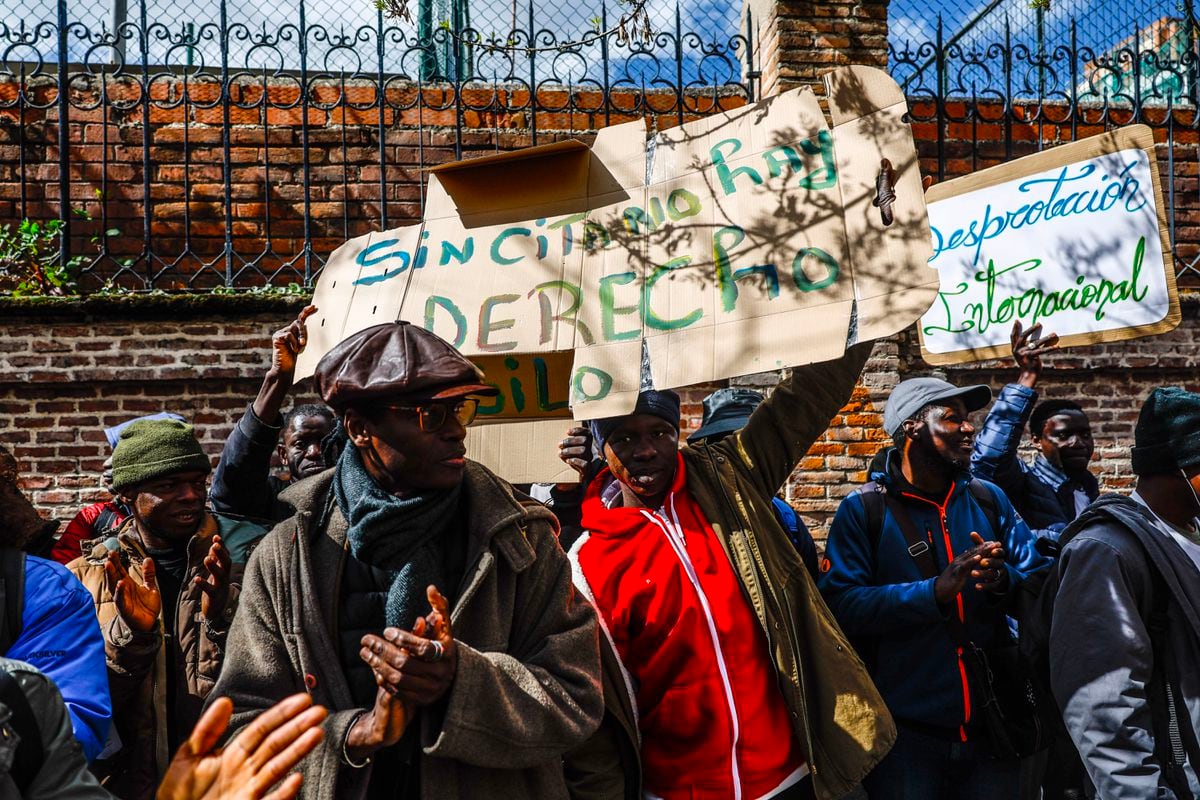Observing the image of more than a thousand naked torsos covered in tattoos and bent over with their shaved heads to the ground, watched over by hooded guards dressed in rigorous black, provokes mixed feelings.
On the one hand, the unspeakable feeling of relief generated by the certainty that that night and those that follow, the citizens will not find any of those prisoners at the end of an alley.
But in the folds of that satisfaction also lies a disturbing thought;
the photo refers to a herd of masses subjected to the power of the club, an image associated with a fascist state.
Between these two sensations it is evident that the first ends up predominating.
Or how else to explain the approval levels of 90% (February data) of Nayib Bukele, the Salvadoran president, responsible for the frontal combat of criminal gangs in his country.
In January, the president inaugurated the largest prison in the world, with a capacity for 40,000 detainees, called the Terrorism Confinement Center, a name that clears up any doubt about the State's attitude against criminals.
That day Bukele tweeted: “Will they be able to give orders from within?
No. Will they be able to escape?
No. A work of common sense.
Common sense or not, the truth is that they are words and images appreciated by most of the citizens of their country, fed up with violence.
Behind the approval ratings enjoyed by Bukele is the vertiginous drop in crime in El Salvador.
From a rate of 106 deaths per 100,000 inhabitants in 2015, the worst in the world, it fell to 7.8 in 2022, similar to that of the United States.
The magnitude of this change can be seen when compared with the figures for Mexico: between 30 and 29 murders per 100,000 inhabitants at the beginning of the six-year term, 28 in 2021 and could drop to 25 this year, still one of the highest among the countries of its size and economic importance: the average in Europe is 1. If the trend of the first months of 2023 continues, El Salvador could end the year as the safest country on the continent,
In exchange for this "tranquility", the Salvadorans have decided to give Bukele many other things.
The president dissolved parliament, imposed a state of emergency that allows any suspect to be treated as a terrorist, with the consequent irregularities in the area of human rights, modified the laws to be reelected, and unceremoniously submits to the critical press.
And yet people enthusiastically vote for him.
The pacification has not translated into an improvement in the economic situation, but the drop in extortion suffered by businesses, the increase in tourism and the positive rating of international agencies, give wings to the Government's promises in the sense that now they will reap the long-awaited prosperity.
Will have to see.
The Bukele model, affirms
The Economist
this week, is not entirely exportable due to the peculiarities of this small country of just over 6 million people and a surface area similar to that of Nayarit.
But tell that to the politicians who are beginning to emerge in Central America and the Caribbean promising something similar.
Mexico does not have the levels of violence that catapulted Bukele, but it does have accumulated weariness after decades of impotence in the face of insecurity and there are regions of extreme violence that emulate that of the Central American country.
I do not see a Bolsonaro or a Bukele on the way to the 2024 presidential election, but, if the insecurity situation does not improve, there could be such a risk for 2030 or even for the referendum to revoke the mandate in 2026 or 2027. In a proportion of 9 out of 10, Salvadorans support those who have taken away their essential freedoms.
It's very easy to judge them, but we shouldn't.
What should be done is to prevent at all costs from reaching that blind alley, in which we are forced to choose between such a terrible melon or watermelon.
Faced with such a risk, President Andrés Manuel López Obrador has resorted to the Army, until now little more than face-to-face.
In theory, in the face of an escalation of violence or extreme citizen exasperation, the military and its deployment in barracks throughout the territory would activate and face the threat, thus preventing the arrival of a fascist-style politician who wants to "profit" from fear to insecurity.
Some wonder if the cure is nearly as harmful as the disease, judging by the military's proclivity for violating civil rights.
I do not see that Claudia Sheinbaum or Marcelo Ebrard, the most likely successors in the 4T government, share López Obrador's enthusiasm for the generals in terms of insecurity.
In Mexico City, Sheinbaum has fostered a more articulated alternative in police, not military, terms, supporting a professional police officer, Omar García Harfuch.
For his part, Ebrard, who was secretary of Public Security in the capital, has not hidden his inclination for a civilian option to face the problem.
The opposition's inability to generate convincing proposals or attractive cadres for the majority, sooner or later, will turn the issue of public insecurity and fear into an irresistible vein.
In the United States and Europe, the ultra-right has gained space, and in some cases power, exploiting the fear of migration and imports from China;
How long will it take for the Mexican right to press the key that exploits the fear of hitmen and extortionists?
When a Bukele arrives, he will not necessarily be a right-wing reactionary, but an attractive young man, with easy verbs and skin-deep common sense, a charismatic genius of social networks, capable of promising and convincing many of his ability to produce solutions. magical.
In Brazil, he was related to the Army itself through the retired soldier, Jair Messias Bolsonaro.
Obviously, the best thing would be to solve the problem of public insecurity now, something that is not happening or not at the speed with which it is needed.
If the governments of the 4T or the democratic interests, whatever their tendency, do not wish to be surprised from this flank, they would have to construct their own responses;
the cadres capable of competing with convincing arguments and a politically attractive presence against the Bukeles.
And, for that, he needs the Harfush that he can equip himself with.
I'm not saying it's him, precisely, but the equivalent of him.
Politicians-officials with experience and results in this field, competitive at the polls.
Something, except being easy prey for snake charmers, which there will be.
Jorge Zepeda Patterson Twitter account: @jorgezedap
subscribe here
to the EL PAÍS México
newsletter
and receive all the key information on current affairs in this country
Subscribe to continue reading
Read without limits
Keep reading
I'm already a subscriber


/cloudfront-eu-central-1.images.arcpublishing.com/prisa/HHTRNM3D5ZEDNG3IOS42S5WS4E.jpg)


/cloudfront-eu-central-1.images.arcpublishing.com/prisa/FY5V6P4GBFGVTJRMTBS4UOIEDA.jpg)



/cloudfront-eu-central-1.images.arcpublishing.com/prisa/RHYRDMQQ7BG5JOUSKAXBLKE6YE.jpg)


/cloudfront-eu-central-1.images.arcpublishing.com/prisa/KMEYMJKESBAZBE4MRBAM4TGHIQ.jpg)


